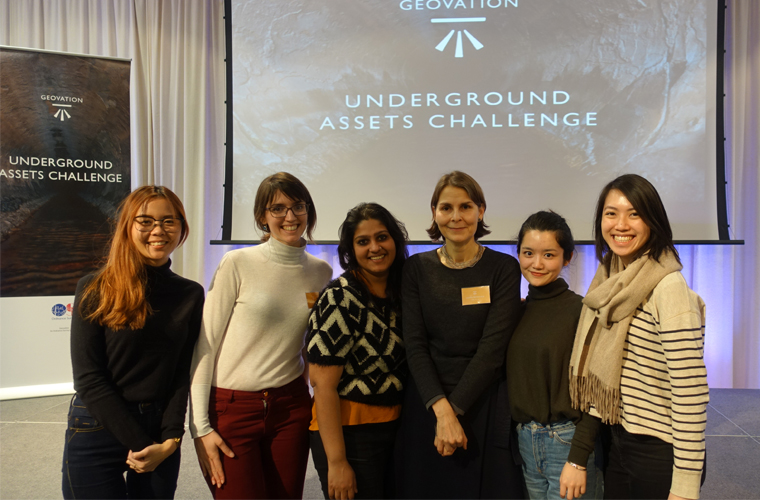Students Jie Tang, Anupa Dasgupta, Tritra Pohsri, Vanessa Chun and Anna Focaroli with Reader and course tutor Alison Prendiville (third from right)
Words by Jyoti Mann
Five students from LCC’s MA Service Experience Design and Innovation recently worked with Ordnance Survey on their Geovation Challenge, held in Southampton across 3 days in February. The Challenge saw 5 teams of finalists, mainly from a technology background, competing to pitch the most successful idea for tackling a real-life problem relating to underground assets – telecommunications, energy, transport, water and sewerage.
The LCC students were matched up with the teams as human-centred design and service design advisors, and worked with them on the refinement and presentation of their ideas. The winning team or teams then have access to the students as consultants to fully develop and implement their concept.
Jie Tang, Anupa Dasgupta, Tritra Pohsri, Vanessa Chun and Anna Focaroli first heard about the Challenge through Reader and course tutor Alison Prendiville, who encouraged their involvement and asked them to be active participants.
The finalists gave the students a large amount of data and information to be presented in 6 minutes, integrating the content and focusing on a specific direction to develop. They only had a few hours to visualise their ideas, using their graphic skills to help them, before the final pitches.
We got in touch with the students involved to hear about their experience.
How did your involvement come about?
Anupa Dasgupta: Our tutor was judging this event and she gave us the opportunity to participate as the service design support. It was great to use service design in geological spaces as the context was very challenging. We were assisting the participants to think more universally, for the betterment of society. Service design is not only about solution-centric process, but more about identifying the gaps and defining ways to bridge them.
What did you gain from the experience?
Tritra Pohsri: To learn how to deal with global issues from experts, especially the underground assets, which we were not too familiar with. Also to be able to help them plan, minimise risk to stakeholders, as well as designing a great service to society.
Which issues were tackled in the challenge?
AD: The challenge circles around operating and mapping underground assets in the UK more effectively to prevent risks. Building and designing systems which foster better management for specific users, tackling issues, and creating more awareness and solutions.
Why is it important for you to be involved in a project which potentially could have global impact?
Vanessa Chun: I have been privileged enough to have a very international background and to have seen much of the world, both the good and the bad. Because of this, I have always been a very globally minded citizen, and my goal has always been to make a positive impact in the world. While ambition is extremely important (an area where I’m not lacking), I think it’s equally important to keep things in perspective.
I learned through the Geovation camp to “think globally, act locally”, keeping global impact in mind, but starting out small in a local area to test an idea and scale up later. Of course I’d love to change the world immediately, but as with all great things, it must start with a small seed, and then grow.
What advice would you give to students seeking to get involved in the challenge or begin a career in this area?
VC: Don’t be afraid of change. Oftentimes, people get extremely attached to the one idea they thought up of initially, and as they gather more and more information, it’s evident that the idea no longer makes sense. It can be hard to let go of something that you’ve dreamt up, but I think the quicker you can do that, the quicker you can allow for newer and more relevant ideas to take their place.
What advice do you have for prospective MA Service Experience Design and Innovation students?
AD: Utilise your past, embrace the uncertainty of the present and design with conviction for the future.
What is next for you after completing the course?
TP: I want to make a difference in local businesses, particularly in developing countries, by integrating design thinking and showing real value through innovation.
What have you most enjoyed whilst studying at LCC?
AD: The energy of various cultures and the exposure to new spaces and ideas.
Neil Brammall, Principal Consultant at Utility Information Services, who participated in the challenge, spoke highly of the students’ involvement:
“My associate and I were very impressed with Jie – both her attitude and the quality of her work. On Friday morning in particular, when the clock was ticking, Jie transformed our pitch with the quality and perspicuity of her visualisation, and made it very easy indeed for us to present a compelling case.”
The company plans to commission Jie for visualisations and the communication of concepts to its potential clients and investors. Neil continued:
“I should also give an honourable mention to Vanessa Chun – she was a “floating” design resource, and gave some of her time and some excellent insights to us on the day. In short, all of the LCC students were a credit to the institution.”



